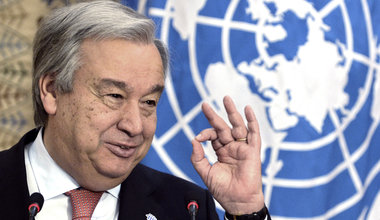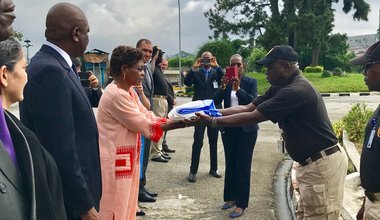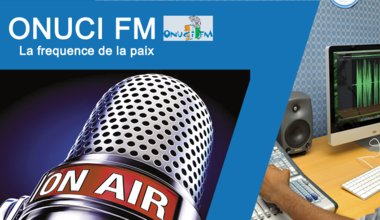PRESS REVIEW OF WEDNESDAY 25 AUGUST 2010
UNOCI calls for
calm management of the electoral appeals
Fraternité Matin
–
The United Nations Operation in Côte d'Ivoire (UNOCI) notes an
increase in verbal tension and physical clashes as the legal phase of the
appeals process progresses. This atmosphere, should it persist, could compromise
the progress already achieved in the conduct of the electoral process. UNOCI
launches an urgent appeal for a return to calm and serenity with a view to
maintaining and consolidating a peaceful electoral environment. In the same
spirit, UNOCI encourages the competent authorities, political actors and
population to strictly apply and respect the law.
UNOCI provides
assistance for the implementation of the cantonment
Nord Sud –
On Friday, UNOCI donated 11 tents to the 4th Military Training Group in Korhogo.
The donation is to help the Military Training Group to better fulfill its
mission. "It is the Ouagadougou Political Agreement which is being given an
impetus, thanks to this donation", said Ba Gatta of UNOCI's Disarmament,
Demobilization and Reintegration (DDR) office. 52 tents and 4 water tanks of
2000 liters will be handed over to the military training group with the logistic
support of the Force Licorne.
Hamadoun Touré
(UNOCI): "It is the Independent Electoral Commission (IEC) which is in charge of
choosing the printers"
Fraternité Matin
–The
United Nations Operation in Côte d'Ivoire (UNOCI), on Monday, through its
spokesperson, Hamadoun Touré, said "there is no conflict" between the
institution and the United Nations Development Programme (UNDP) as announced by
a colleague, especially regarding the venue where the ballot papers and the
reports will be produced. According to some documents, it seems that the UNDP
has decided to print the election-related documents abroad since it finances the
operation. And UNOCI's Electoral Assistance division is seemingly opposed to
that decision in accordance with Ivorian law in this regard. "UNOCI acts like an
adviser to the IEC. It therefore merely draws the IEC's attention to the respect
of the regulations. It is the IEC which is responsible for choosing the
printers", the spokesperson said. He however added: "The decree states that the
printers should be selected here but we can have foreign applicants". Hamadoun
Touré reassured everybody regarding the cooperation. «UNDP and us are working in
the same direction to emerge from the crisis". For his part, the spokesperson of
the Independent Electoral Commission (IEC), Bamba Yacouba, said he was not aware
of this affair. Nevertheless he acknowledges that there is a partnership between
the IEC and UNDP and also that a meeting was held but he does not know the
conclusions. "A meeting was held but I do not know the result", he said. The
IEC's permanent Secretary and spokesperson added that his institution is
awaiting the end of the legal phase of the appeals process to give more
clarifications on its electoral timetable, especially the remaining major steps
before the presidential election scheduled for 31 October. The meeting of the
IEC's central Commission which will be held on Wednesday 25 is therefore
decisive.
Production of
ballots papers: the controversy over electoral documents has instigated
Bouikalo-Bi Thierry, Director General of the National Printing Works to break
his silence «the national printers can do it at a lower price"
Fraternité Matin
–
Is there any problem or distrust vis-à-vis the National Printing Works regarding
the production of the ballot papers and other election-related documents to such
a point that the UNDP wants to print the documents abroad?
BBT:
This is not because of mistrust. Anyway the new IEC team has not yet worked with
the National Printing Works to speak about mistrust. If not, usually, it is the
National Printing Works which produces the documents with the other Ivorian
printing outfits which will be selected. So the fact of doing this abroad,
means that there is a problem we do not know. UNDP is the United Nations
Development Programme and if we have to develop structures in other countries, I
think that this development should be done inside these countries. We cannot say
that we want to finance an activity in a given country and then pay printers
abroad. This is not possible and we cannot understand it.
Did you
participate in a meeting on this matter?
BBT:
absolutely! I have participated in a meeting with UNOCI, UNDP the
National Publishing Company and the Independent Electoral Commission (IEC). The
National Publishing Company was the last to talk. When UNOCI suggested that all
the electoral materials must be done in Cote d'Ivoire, the UNDP said: "I am the
one who is funding the process. I have some requirements. The documents must be
printed abroad". They want to print them in Copenhagen. As a matter of fact,
they know where they want to go. They want to print the ballot papers and the
electoral reports there. Only posters, flyers and other internal documents will
be done here. The UNDP has decided to print the most expensive and most
essential electoral materials outside Côte d'Ivoire. Not only the Ivorian
government is going to spend lots money because of such a decision but also the
technical design they presented us does not suit us as printers. What the UNDP
wants to do will be more expensive than what we could have proposed for a
developing country like Côte d'Ivoire. Many other African countries bring their
electoral materials to Côte d'Ivoire, including ballot papers for printing. This
means that we do have reliable structures that can validly do what our partners
want to achieve abroad, especially in Europe.
In theory, you
have a second meeting Tuesday (Yesterday)...
BBT : Exactly,
unfortunately they were all busy. The central commission of the IEC had a
meeting. The meeting has postponed for Wednesday (today).
Who must choose
the printer?
The IEC and the
National Publishing Company choose the printing companies who could help us
produce the electoral materials. According to article 23 of the electoral code,
it is the National Publishing Company under the supervision of the IEC that
makes the choice.
Has the UNDP
already visited your company to assess its technical value? How do you explain
its desire to go abroad?
BBT: only the
UNDP can answer to that question. Even if our company was unable to work on
these materials, we remain the first publishing company and the technical
adviser of the IEC. As a matter of fact, all the publishers are trained in Cote
d'Ivoire.
In the current
state of the electoral process, at which level are you in the preparations?
BBT: The
National Publishing Company is ready. We have
the machinery we need to do this work. However, since we will be asked to work
on a large quantity of material in a short time, we are obliged to ask other
printers to help us. We are authorized by law to do it. We now understand we
have not been associated with the making of the ballots. They prevented the
publishers in Cote d'Ivoire from knowing the technical characteristics of ballot
paper. But this is against the law.
Is there any
political reason for this choice?
BBT: we are not
politicians. We are technicians. We believe that we can do the same thing here
at a lower cost. The elections are held in one day. The ballot after the
elections is cast away. That means that in only one single day billions are
swallowed up. We can avoid this by letting us do the materials at a more
affordable cost. We believe that the money budgeted for this election by the
UNDP is excessive. As a technician, we will submit a budget for comparison and
we believe that as a small country, we can live with that, instead of going to
swallow up billions for these things where a small amount would be useful for
the same good cause.
Alain Lobognon
(The Prime Minister's Adviser): "We must be very careful; Cote d'Ivoire is in
jeopardy again"
Le Patriote -
On UNOCI-FM, the special adviser of the Prime Minister spoke his
truths about the appeals. He drew people's attention to the danger the country
is facing.
LP: Mr. Alain
Lobognon, what conclusions can you draw today on the electoral appeals?
Alain Lobognon:
[...] Today, we can not make any conclusion. However, we must note a certain
desolation in people and a certain slowness of the process.
[...] LP: So how
can we draw people's attention before it is too late?
AL: The appeals
are a matter for the IEC and the Ivorian judiciary. These two structures must
fully play their role so that Côte d'Ivoire does not fall back into crisis. What
is happening now is jeopardizing the country.
L.P.: Why did we
get here?
AL: The issue of
the appeals is not the business of the national commission for supervision and
identification. The Ministry of Justice and the IEC are expected to lead this
process. We repeat, if nothing is done, Côte d'Ivoire may crumble again. [...]
 ONU
ONU Nations Unies Maintien de la paix
Nations Unies Maintien de la paix



